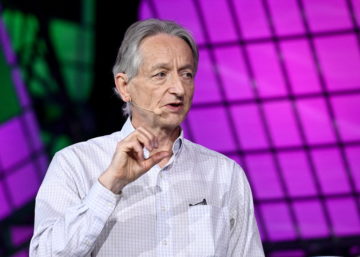Joshua Rothman at The New Yorker:
 Geoffrey Hinton, the computer scientist who is often called “the godfather of A.I.,” handed me a walking stick. “You’ll need one of these,” he said. Then he headed off along a path through the woods to the shore. It wound across a shaded clearing, past a pair of sheds, and then descended by stone steps to a small dock. “It’s slippery here,” Hinton warned, as we started down.
Geoffrey Hinton, the computer scientist who is often called “the godfather of A.I.,” handed me a walking stick. “You’ll need one of these,” he said. Then he headed off along a path through the woods to the shore. It wound across a shaded clearing, past a pair of sheds, and then descended by stone steps to a small dock. “It’s slippery here,” Hinton warned, as we started down.
New knowledge incorporates itself into your existing networks in the form of subtle adjustments. Sometimes they’re temporary: if you meet a stranger at a party, his name might impress itself only briefly upon the networks in your memory. But they can also last a lifetime, if, say, that stranger becomes your spouse. Because new knowledge merges with old, what you know shapes what you learn. If someone at the party tells you about his trip to Amsterdam, the next day, at a museum, your networks may nudge you a little closer to the Vermeer. In this way, small changes create the possibility for profound transformations.
more here.
